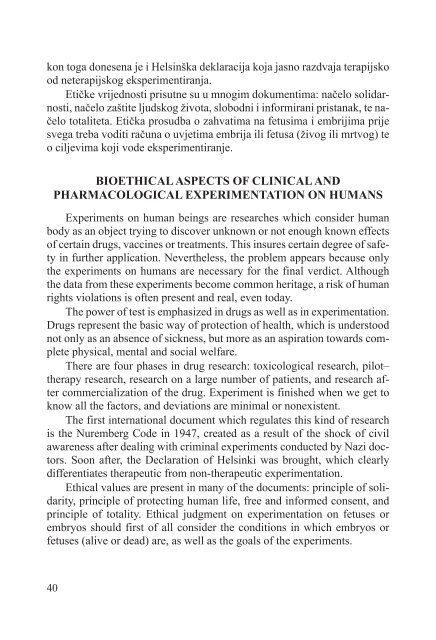Programska knjižnica 9. Lošinjskih dana bioetike - Hrvatsko ...
Programska knjižnica 9. Lošinjskih dana bioetike - Hrvatsko ...
Programska knjižnica 9. Lošinjskih dana bioetike - Hrvatsko ...
Create successful ePaper yourself
Turn your PDF publications into a flip-book with our unique Google optimized e-Paper software.
kon toga donesena je i Helsinška deklaracija koja jasno razdvaja terapijsko<br />
od neterapijskog eksperimentiranja.<br />
Etičke vrijednosti prisutne su u mnogim dokumentima: načelo solidarnosti,<br />
načelo zaštite ljudskog života, slobodni i informirani pristanak, te načelo<br />
totaliteta. Etička prosudba o zahvatima na fetusima i embrijima prije<br />
svega treba voditi računa o uvjetima embrija ili fetusa (živog ili mrtvog) te<br />
o ciljevima koji vode eksperimentiranje.<br />
BIOETHICAL ASPECTS OF CLINICAL AND<br />
PHARMACOLOGICAL EXPERIMENTATION ON HUMANS<br />
Experiments on human beings are researches which consider human<br />
body as an object trying to discover unknown or not enough known effects<br />
of certain drugs, vaccines or treatments. This insures certain degree of safety<br />
in further application. Nevertheless, the problem appears because only<br />
the experiments on humans are necessary for the final verdict. Although<br />
the data from these experiments become common heritage, a risk of human<br />
rights violations is often present and real, even today.<br />
The power of test is emphasized in drugs as well as in experimentation.<br />
Drugs represent the basic way of protection of health, which is understood<br />
not only as an absence of sickness, but more as an aspiration towards complete<br />
physical, mental and social welfare.<br />
There are four phases in drug research: toxicological research, pilot–<br />
therapy research, research on a large number of patients, and research after<br />
commercialization of the drug. Experiment is finished when we get to<br />
know all the factors, and deviations are minimal or nonexistent.<br />
The first international document which regulates this kind of research<br />
is the Nuremberg Code in 1947, created as a result of the shock of civil<br />
awareness after dealing with criminal experiments conducted by Nazi doctors.<br />
Soon after, the Declaration of Helsinki was brought, which clearly<br />
differentiates therapeutic from non-therapeutic experimentation.<br />
Ethical values are present in many of the documents: principle of solidarity,<br />
principle of protecting human life, free and informed consent, and<br />
principle of totality. Ethical judgment on experimentation on fetuses or<br />
embryos should first of all consider the conditions in which embryos or<br />
fetuses (alive or dead) are, as well as the goals of the experiments.<br />
40

















